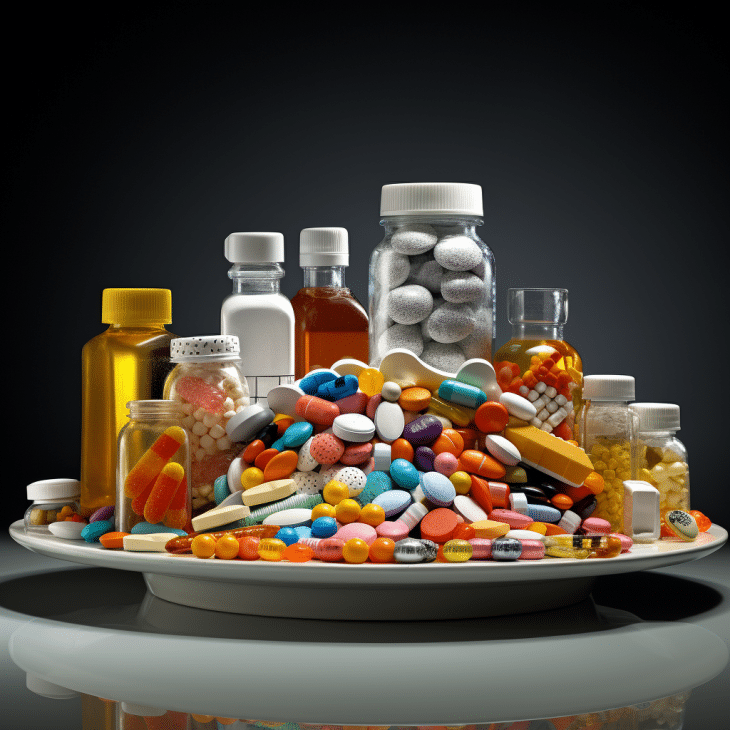Medications are meant to treat medical conditions and improve health, but some can have the unintended consequence of weight gain, which can then worsen other health risks.
Understanding which medications tend to cause weight gain and the mechanisms behind this effect can help patients and doctors make informed treatment decisions.
Key Facts:
- Medications for diabetes, hypertension, psychiatric disorders, seizures, HIV and more can cause weight gain of a few pounds to over 10% of body weight.
- Weight gain is linked to worse cardiometabolic health, including metabolic syndrome, insulin resistance, fatty liver disease and higher cardiovascular risk.
- Medication-induced weight gain results from complex effects on appetite, metabolism, fat storage, inflammation and more. Genetics play a role.
- Switching to alternative medications with lower metabolic impact, adding treatments to counteract weight gain, lifestyle changes, and careful monitoring can help manage this side effect.
Source: Endotext 2019
The Obesity Epidemic and Medication-Induced Weight Gain
Obesity has reached epidemic proportions, now affecting over 40% of American adults.
Carrying excess weight increases the risk of chronic diseases like type 2 diabetes, fatty liver disease, cardiovascular disease and some cancers.
When medications cause weight gain on top of existing obesity, it can worsen health outcomes.
While genetics, diet and lifestyle play key roles in the development of obesity, certain prescription medications are also known contributors.
Medication-induced weight gain is reported in up to 70% of patients taking some drugs long-term.
Weight gain varies based on the drug class and individual factors, but averages 1-5 kg in a year for some commonly used medications.
However, more severe weight gain above 10 kg is seen in around 20% of patients on certain drugs.
Medication-induced weight gain results from complex effects on appetite, metabolism, fat storage, inflammation and other pathways.
Genetic differences in how individuals metabolize and respond to medications also influence side effects like weight gain. (Read: Pharmacogenetics & Weigh Gain from Drugs)
Identifying drugs that perturb weight regulation and understanding the mechanisms involved can help guide treatment choices and preventive strategies when prescription medications are necessary.
Related: Top Drugs & Meds Causing Weight Gain (2022)
Diabetes Drugs & Weight Gain
Over 30 million Americans have diabetes, and many more have prediabetes or metabolic syndrome.
Obesity is a major risk factor for developing these conditions, so diabetes medications that lead to further weight gain can worsen health outcomes.
Insulin, sulfonylureas, and thiazolidinediones used to treat diabetes are associated with unwanted weight gain.
Insulin & Sulfonylureas
Insulin is a foundational diabetes treatment, replacing or supplementing insufficient natural insulin production.
Insulin causes dose-dependent weight gain by increasing appetite and caloric intake, reducing metabolic rate, and promoting fat storage by inhibiting lipolysis.
Sulfonylureas like glipizide and glyburide stimulate insulin secretion, and have similar weight-promoting effects as insulin therapy itself.
Weight gain is most rapid in the first months after initiating insulin or sulfonylureas, plateauing after about a year of therapy.
Combining metformin along with insulin can help reduce appetite stimulation and weight gain.
Newer diabetes medications like SGLT2 inhibitors and GLP-1 receptor agonists promote weight loss, and can be added to counteract the weight effects of insulin or sulfonylureas.
Thiazolidinediones
Pioglitazone and rosiglitazone improve insulin sensitivity through effects on gene expression in fat tissue.
They reliably cause dose and time-dependent weight gain, averaging 2-5 kg over one year.
Fluid retention and increased fat cell size and number contribute to added pounds.
However, thiazolidinediones favor peripheral fat accumulation over dangerous visceral fat.
Though they increase weight, thiazolidinediones actually reduce liver fat and inflammation, providing metabolic benefits for some diabetes patients.
Blood Pressure Drugs & Weight Gain (Antihypertensive Agents)

Obesity and hypertension commonly coincide, so antihypertensive drugs that boost weight can worsen cardiometabolic health.
Beta-blockers and certain calcium channel blockers used to treat high blood pressure are most likely to increase weight.
Beta-Blockers
Propranolol, atenolol and metoprolol are examples of commonly prescribed beta-blockers that antagonize catecholamines like epinephrine at beta-adrenergic receptors, which lowers heart rate and blood pressure.
They also slow metabolism and reduce fat breakdown, causing modest weight gain.
Alternatives like the vasodilating beta-blockers nebivolol and carvedilol have more favorable metabolic effects.
If beta-blocker therapy is necessary, monitoring for blood sugar and lipid changes in addition to weight is prudent.
Combination therapy with metformin or switching to better-tolerated medications may mitigate beta-blocker-induced metabolic effects in some cases.
Genetic differences influencing catecholamine signaling may help explain why some patients are more prone to beta-blocker weight gain and related cardiometabolic changes.
Calcium Channel Blockers
Most calcium channel antagonists like amlodipine have neutral effects on weight.
However, the migraine medication flunarizine reliably increases appetite and weight.
Its anti-dopamine activity in the brain’s appetite control centers likely drives this effect.
Psychiatric Drugs & Weight Gain
Obesity, metabolic syndrome and mood disorders like depression share overlapping physiology, compounding each other.
Many first-line psychiatric medications significantly increase body weight, which can then further worsen metabolic health.
The degree of weight gain varies by drug class and individual characteristics.
Antidepressants
Certain antidepressants have dramatic weight effects, while others appear weight neutral.
Tricyclic antidepressants like amitriptyline reliably increase weight by 5 kg or more annually regardless of the underlying psychiatric condition. Exact mechanisms are unknown.
Among selective serotonin reuptake inhibitor (SSRI) antidepressants, paroxetine (Paxil) often leads to weight gain, while sertraline (Zoloft) and fluoxetine (Prozac) tend to be weight neutral.
Bupropion (Wellbutrin) is unique in suppressing appetite and slightly reducing weight.
Mirtazapine (Remeron), a tetracyclic antidepressant, is one of the worst offenders for weight gain given its antihistamine effects and stimulation of appetite hormones.
However, its effectiveness for some patients merits efforts to manage resulting weight and metabolic changes through lifestyle modification, added medications or switching antidepressants if needed.
Atypical Antipsychotics
Second generation antipsychotics like olanzapine (Zyprexa) to treat schizophrenia, bipolar disorder and other psychiatric illness cause rapid and severe weight gain in a majority of patients.
An average gain of 20% beyond baseline weight is not uncommon.
However, atypical antipsychotics have advantages over earlier drugs with fewer neurological side effects.
Weight gain results from combined effects on appetite, metabolism, fat storage, inflammation and insulin resistance.
Genetics may play a role as well.
Careful monitoring, lifestyle intervention, switching to lower-risk medications, and adding treatments like metformin and GLP-1 analogues can help manage substantial antipsychotic-induced weight gain when these drugs are clinically indicated.
Seizure Drugs & Weight Gain (Anticonvulsants)
Many seizure medications including valproic acid (Depakote) and pregabalin (Lyrica) increase weight, while others like topiramate (Topamax) reduce weight.
The drug of choice may be selected in part based on weight effects if seizure control is expected to be comparable.
Valproic acid acts on the hypothalamus to increase appetite and caloric intake.
It promotes abdominal obesity, insulin resistance, inflammation and fatty liver – metabolic disturbances that are not simply secondary to weight gain.
Close monitoring for dysglycemia, dyslipidemia and liver enzymes is warranted.
Topiramate has appetite suppressant and metabolic effects that counteract potential weight gain from other psychiatric medications when used adjunctively.
Steroids & Weight Gain
Glucocorticoid steroids like prednisone strongly stimulate appetite while redistributing body fat to visceral depots.
They alter signaling in the hypothalamus and fat tissue by several molecular mechanisms, promoting weight gain and abdominal obesity.
Over 10 kg of weight gain in the first year of steroid therapy is not uncommon.
Preventing this side effect remains challenging given the immunosuppressant and anti-inflammatory benefits of steroids for many conditions.
However, research into more targeted approaches to block detrimental metabolic effects of steroids while preserving therapeutic effects may lead to better options in the future.
HIV Drugs & Body Fat Gain (Antiretroviral Agents)
Highly active antiretroviral therapy (HAART) used to treat HIV is lifesaving, but was quickly found to have metabolic side effects.
A syndrome termed HIV-associated lipodystrophy includes both peripheral fat loss and accumulation of belly fat.
While HAART reversed fat wasting associated with uncontrolled HIV/AIDS, it also perturbs fat metabolism via effects on inflammation, cortisol, mitochondrial function and other pathways.
Genetic mitochondrial differences make some patients more vulnerable to fat tissue changes.
Switching antiretroviral medications and targeted therapies like growth hormone analogs and metformin may mitigate lipodystrophy.
Lifestyle intervention to reduce abdominal obesity and associated metabolic complications is also important for reducing elevated cardiovascular risk in treated HIV patients.
Takeaways: Prescription Drugs & Weight Gain
A variety of common prescription medications can lead to unwanted weight gain and worsened cardiometabolic health when taken long-term.
The degree of weight gain varies based on the drug category and individual characteristics like genetics. Some patients gain over 10 kg.
Complex mechanisms involving appetite, metabolism, inflammation, cortisol and fat storage underlie medication-induced obesity.
Frequent weight monitoring and early intervention including lifestyle changes, switching drugs or adding therapies can help manage this side effect when stopping problematic medications is not an option.
Research to better understand and prevent medication-induced weight gain continues, providing hope for improved future therapies.
References
- Study: Drugs that affect body weight, body fat distribution, and metabolism
- Authors: Ann A. Verhaegen MD & Luc F Van Gaal MD PhD (2019)







